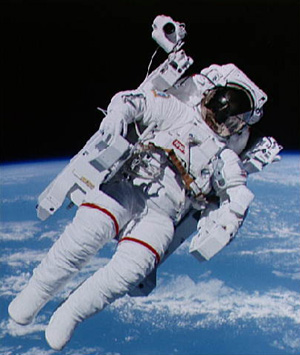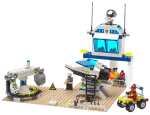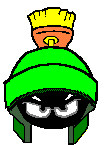


BY:

Mrs. Susan Stein

This image, from NASA, shows astronaut Bruce McCandless floating freely in space near the Space Shuttle.
Kids, please stay on TASK when using links!!
|
|
|
|
|
|
|
|
|
|
|
|
|
|
|
|
|
|
|
|
|
|
|
|
|
|
|
|
Visit these links, but always stay on task! It is fun to visit with an adult helper. Great links for Teachers, too!
 Visit the Space Telescope
Science Institute
Visit the Space Telescope
Science Institute
 LEGO
Town Space Simulation Station (6455)
LEGO
Town Space Simulation Station (6455)

freely in space near the Space Shuttle.
TO GO TO TOP JUST CLICK ON ABOVE LINK
 Click on any Marvin to bring you back here.
Click on any Marvin to bring you back here.
SCULPT-A-PLANET: http://www.kinderart.com/sculpture/planet.htm
These planets are actually made from balloons, glue, and newspaper in a papermache project. Create a solar system, complete with moons, to hang in your classroom.
SPACE-THEMED COLORING PAGES: http://kids.msfc.nasa.gov/puzzles/coloring/
Find a sizeable collection of both on and off-line coloring pages, of rockets, earth, satellites, the space station, a space shuttle, and more.
On Line Jigsaw Puzzle- over 80 pieces-http://www.coloring.ws/puzzles/5.htm
SPACE-THEMED CRAFTS: http://www.dltk-kids.com/crafts/space/space.html
For early elementary students, find instructions for making moon rocks, space collages, a universe in a jar, and more.
SPACE AND PLANET ACTIVITIES: http://www.childfun.com/themes/space.shtml
Crafts, poems, recipes, games, and activities all gear up for a fun-filled space-themed unit for your elementary class.
ONCE IN A BLUE MOON: http://askeric.org/cgi-bin/printlessons.cgi/Virtual/Lessons/%20Science/Space_Sciences/SPA0016.html
Compliment your moon phases unit with this art activity using watercolor and white glue. Students will create a mini-book with their moon pictures by attaching a written page including a few basic facts they have learned about the moon. You can extend this activity by creating a flip-book illustrating the phases of the moon.
SOLAR SYSTEM PUZZLE KIT: http://www.spacedu.com/nasa%20online%20lessons/Solar_System_Puzzle_Kit.pdf
Download this pdf kit from NASA; your students can make an eight-cube solar system puzzle of the entire solar system with the kit, while learning much about the asteroids, sun, and planets. Grades 5-8.
PSRD Planetary Science Research Discoveries educational site sharing the latest research on planets, meteorites, and other solar system bodies being made by NASA-sponsored scientists. PSRD is a vital link for education, planetary and space science, and for learning how science works.
Space Science Activities featured in Future Flight Hawai`i, a K-12 Education project of the Hawai`i Space Grant Consortium.



SOLAR SYSTEM ONLINE: http://quest.arc.nasa.gov/sso/ Here is a good starting point for any project on the solar system. Find background info for research, bios on NASA experts, live images from Hubble, and activities for students to pursue.
OUR SOLAR SYSTEM: http://www.ospi.wednet.edu:8001/curric/space/planets/ Basic information about the planets and their properties; click on the links for more in-depth information and research.
SOLAR SYSTEM EDUCATION: http://solarsystem.nasa.gov/education/education.html Intended mainly as an extensive resource for educators, students can nevertheless navigate the site for up to the minute information and research on the planets, the latest technologies, and key concepts.
WELCOME TO MISSION CONTROL: http://europa.la.asu.edu/epo/mission_control/index.html Students can take a virtual field trip through space-- chose from being a surveyor on Mars, choosing a Magellan mission to Venus, or Galileo at Jupiter.
STUDENTS' RESOURCE PAGE: http://www.jpl.nasa.gov/forum/students.html Start with Intro to the Nine Planets and Welcome to the Nine Planets, and go on to explore views of the solar system and robotic spacecraft.
STUDENT PROJECTS . . . MAKE SCALE MODELS OF THE PLANETS: http://marsnt3.jpl.nasa.gov/education/modules/webpages/activity1.htm By creating two-dimensional models to scale, students will devise an accurate representation of planet size.
RETURNING PICTURES FROM SPACE: http://europa.la.asu.edu/epo/rpfs.html How are space images transmitted and received? Students can find out here, and then apply their learning to interpreting digital images from Jupiter.
WHAT CAN CRATERS TELL US ABOUT A PLANET? http://marsnt3.jpl.nasa.gov/education/modules/webpages/activity3.htm Students will learn to study impact craters and learn how to interpret their meaning in a geological sense.
CHART YOUR COURSE: http://www.fi.edu/fellows/fellow9/dec98/outline.htm Use this outline guide to help develop your research project, or for activity suggestions.